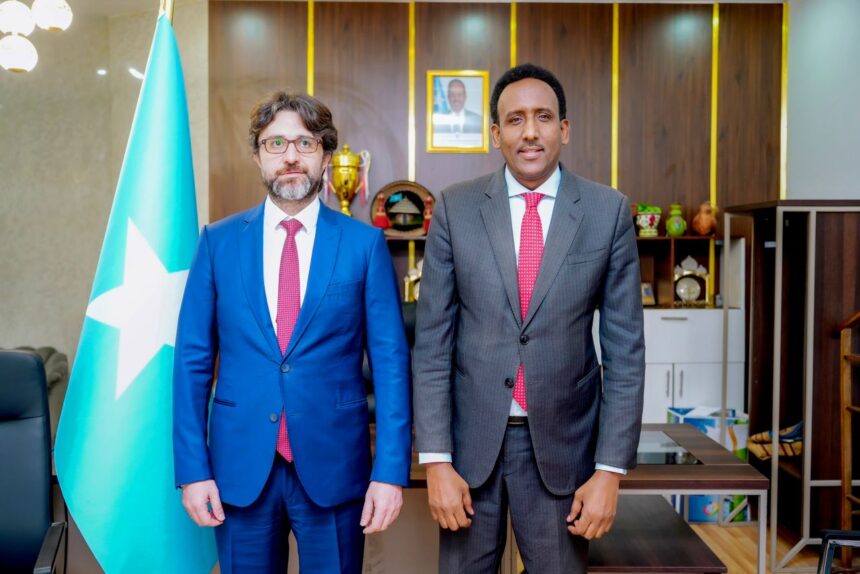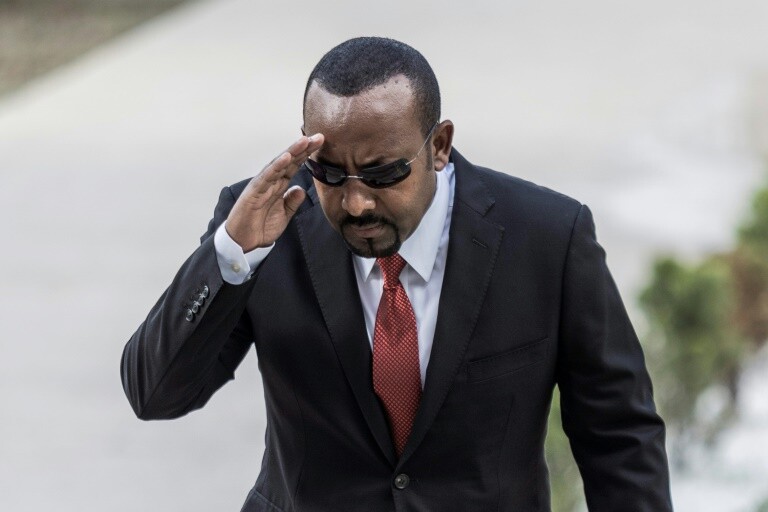 « Les biens mal acquis de la famille et de l’entourage du président de Djibouti risquent de jouer sur l’élection du président de la commission de l’Union Africaine en février 2025 » d’après un ex haut responsable du renseignement de la Somaliland.
« Les biens mal acquis de la famille et de l’entourage du président de Djibouti risquent de jouer sur l’élection du président de la commission de l’Union Africaine en février 2025 » d’après un ex haut responsable du renseignement de la Somaliland.
Depuis quelques semaines, la question d’un remaniement ministériel à Djibouti fait l’objet de discussions intenses dans les cercles politiques et diplomatiques. En effet, cette perspective semble se dessiner, notamment dans le contexte de la candidature de Mohamed Ali Youssouf à un poste clé au sein de l’Union africaine (UA). La question qui se pose aujourd’hui est de savoir si un remaniement ministériel pourrait être orchestré dans le but de freiner les ambitions de ce diplomate chevronné, connu pour son influence croissante dans les affaires internationales.
Un diplomate reconnu, mais une candidature controversée.
Mohamed Ali Youssouf, ministre des Affaires étrangères de Djibouti, est une figure éminente sur la scène internationale. Il a occupé ce poste pendant plusieurs années et a joué un rôle clé dans l’établissement des relations diplomatiques entre Djibouti et de nombreux pays africains, notamment en raison de la position géostratégique de Djibouti, un carrefour maritime majeur. Son implication dans la diplomatie régionale et internationale lui a permis de renforcer son poids au sein des grandes institutions, y compris l’Union africaine (UA).
Cependant, sa candidature à un poste élevé au sein de l’UA, plus particulièrement celui de Secrétaire général ou d’une autre fonction stratégique, semble susciter des tensions. Bien que le ministre ait le soutien d’une frange significative de la communauté africaine, certains acteurs politiques au sein du régime djiboutien et de la famille présidentielle de Djibouti pourraient percevoir cette ascension comme un challenge direct à leur propre influence au niveau nationale et régionale.
Les dynamiques internes et les enjeux de pouvoir.
À Djibouti, le système politique est marqué par une forte concentration de pouvoir autour de la famille présidentielle et de quelques cercles clanico-mafieux restreints. Cette configuration crée souvent des tensions internes lorsqu’un membre de l’élite politique, comme Mohamed Ali Youssouf, manifeste des ambitions sur la scène internationale, particulièrement dans des organisations comme l’Union Africaine, où les enjeux sont à la fois diplomatiques et stratégiques.
Les observateurs locaux suggèrent que les ambitions de Youssouf pourraient déranger certains membres du gouvernement, notamment ceux ayant des intérêts économiques personnels ou politiques liés à la consolidation du pouvoir au niveau national. Dans ce contexte, la question d’un remaniement ministériel n’est pas seulement une question de réorganisation interne, mais aussi un moyen de faire face à une candidature jugée non conforme aux intérêts de la famille présidentielle et du cercle clanico-mafieux restreint à Djibouti.
Les raisons qui poussent le président Ismael Omar Guelleh à contrer la candidature de Mohamed Ali Youssouf à l’UA.
La montée en puissance de Mohamed Ali Youssouf sur la scène diplomatique africaine semble déranger en général la famille présidentielle à Djibouti et en particulièrement le président Ismael Omar Guelleh. Sans toutefois faire sans opposant ouvertement, plusieurs éléments suggèrent que ce dernier pourrait chercher à empêcher la candidature de son ministre des Affaires étrangères à la présidence de la Commission de l’Union Africaine (UA).
Tout d’abord, la famille présidentielle de Djibouti, en particulier à travers des investissements dans des secteurs stratégiques, semble se sécuriser économiquement.
Particulièrement :
- les logements huppés dans le quartier GIGIRI à Nairobi, appartement à la famille de Guelleh etgérés par madame Maryan Saleban (clan Habargidir/Hawiye),
- l’ouverture d’une branche de Salaam Bank à Kampala, sont des signes d’un renforcement des intérêts familiaux dans la région,
- le câble DARE 1, contrôlé de manière illégale par la famille présidentielle de Djibouti,
- des investissements dans les minerais à Kinshasa, renforcent la position économique de sa famille présidentielle de Djibouti dans la région.
Face à l’ascension de Mohamed Ali Youssouf, dont la personnalité s’impose de plus en plus en Afrique, Ismaël Omar Guelleh pourrait estimer que la candidature de son ministre pourrait constituer une menace pour son propre pouvoir. De plus, l’absence de soutien clair de Guelleh envers le processus de réformes de l’UA mené par le président rwandais Paul Kagame pourrait indiquer une volonté de préserver l’influence de Djibouti au sein de l’organisation et de limiter la compétition interne. Ces éléments soulignent un jeu de pouvoir complexe à l’approche des élections à la tête de la Commission de l’UA.
La nomination de Mohamed Ali Youssouf à un poste national d’intérêt institutionnel ou politique majeur suscite de nombreuses discussions.
Selon des informations provenant d’un ancien haut responsable des services de renseignement de la Somaliland, la National Intelligence Agency of Somaliland (NIA), des rumeurs circulent au sein du cercle restreint de la famille Guelleh concernant la nomination de Mohamed Ali Youssouf au poste de Premier ministre, ainsi qu’à celui de futur directeur de la campagne présidentielle de Guelleh pour sa succession lors du sixième mandat en 2026.
Mohamed Ali Youssouf appartient au clan Ayrolasso/Afar du côté paternel et au clan Ada-Ali/Afar du côté maternel, deux clans puissants de Tadjourah, qui exercent une grande influence dans l’appareil coutumier de l’ethnie Afar.
Il convient également de rappeler qu’une vidéo diffusée en 2022 sur les réseaux sociaux avait révélé des propos de la première dame de Djibouti, Kadra Mohamoud Haid, qui avait déclaré : « Il ne peut pas nous ramener deux Afars. On le garde pour ses compétences en diplomatie internationale. »
Hassan Cher
English translation of the article in French.
Djibouti/AU: Will there be a ministerial reshuffle to block Mohamed Ali Youssouf’s AU candidacy?
“The ill-gotten gains of the Djibouti president’s family and entourage are likely to affect the election of the African Union commission chairman in February 2025,” according to a former Somaliland intelligence official.
For some weeks now, the question of a ministerial reshuffle in Djibouti has been the subject of intense discussion in political and diplomatic circles. Indeed, this prospect seems to be taking shape, particularly in the context of Mohamed Ali Youssouf’s candidacy for a key post within the African Union (AU). The question now is whether a ministerial reshuffle could be orchestrated to curb the ambitions of this seasoned diplomat, known for his growing influence in international affairs.
A renowned diplomat, but a controversial candidacy.
Mohamed Ali Youssouf, Djibouti’s Minister of Foreign Affairs, is a prominent figure on the international scene. He held the post for several years and played a key role in establishing diplomatic relations between Djibouti and many African countries, not least because of Djibouti’s geostrategic position as a major maritime crossroads.
His involvement in regional and international diplomacy has strengthened his influence within major institutions, including the African Union (AU).
However, his candidacy for a senior position within the AU, particularly that of Secretary General or another strategic function, seems to be causing some tension. Although the Minister has the support of a significant fringe of the African community, certain political players within the Djibouti regime and the Djibouti presidential family could perceive this ascension as a direct challenge to their own influence at national and regional level.
Internal dynamics and power stakes.
Djibouti’s political system is marked by a high concentration of power around the presidential family and a few restricted clan-mafia circles. This configuration often creates internal tensions when a member of the political elite, such as Mohamed Ali Youssouf, manifests ambitions on the international stage, particularly in organizations such as the African Union, where the stakes are both diplomatic and strategic.
Local observers suggest that Youssouf’s ambitions could upset certain members of the government, particularly those with personal economic or political interests linked to the consolidation of power at national level. In this context, the question of a ministerial reshuffle is not just a matter of internal reorganization, but also a means of dealing with a candidacy deemed not to conform to the interests of the presidential family and Djibouti’s restricted clan-mafia circle.
President Ismael Omar Guelleh’s reasons for opposing Mohamed Ali Youssouf’s candidacy for the AU.
Mohamed Ali Youssouf’s rise to prominence on the African diplomatic scene seems to be upsetting the presidential family in Djibouti in general, and President Ismael Omar Guelleh in particular. Without openly opposing him, several factors suggest that the latter may be seeking to prevent his Foreign Minister from running for the presidency of the African Union (AU) Commission.
Firstly, Djibouti’s presidential family, particularly through investments in strategic sectors, seems to be securing itself economically.
Particularly :
– the luxury apartments in Nairobi’s GIGIRI district, owned by Guelleh’s family and managed by Madame Maryan Saleban (Habargidir/Hawiye clan),
– the opening of a branch of Salaam Bank in Kampala, are signs of a strengthening of family interests in the region,
– the DARE 1 cable, illegally controlled by Djibouti’s presidential family,
– investments in minerals in Kinshasa, reinforce the Djibouti presidential family’s economic position in the region.
Faced with the rise of Mohamed Ali Youssouf, whose personality is increasingly imposing itself in Africa, Ismaël Omar Guelleh may feel that his minister’s candidacy could pose a threat to his own power. Moreover, Guelleh’s lack of clear support for the AU reform process led by Rwandan President Paul Kagame could indicate a desire to preserve Djibouti’s influence within the organization and limit internal competition. These elements underline a complex power game in the run-up to the elections for the head of the AU Commission.
The appointment of Mohamed Ali Youssouf to a national post of major institutional or political interest is the subject of much discussion.
According to information from a former senior official of the Somaliland intelligence service, the National Intelligence Agency of Somaliland (NIA), rumors are circulating within the inner circle of the Guelleh family concerning the nomination of Mohamed Ali Youssouf for the post of Prime Minister, as well as for that of future director of Guelleh’s presidential campaign to succeed him in the sixth term of office in 2026.
Mohamed Ali Youssouf belongs to the Ayrolasso/Afar clan on his father’s side and to the Ada-Ali/Afar clan on his mother’s side, two powerful clans in Tadjourah, which exert great influence in the customary apparatus of the Afar ethnic group.
It should also be recalled that a video posted on social networks in 2022 revealed remarks by Djibouti’s First Lady, Kadra Mohamoud Haid, who said: “He can’t bring us two Afars. We’re keeping him for his skills in international diplomacy.”
Hassan Cher
Share











